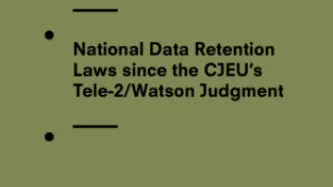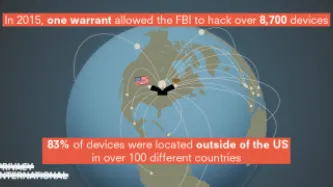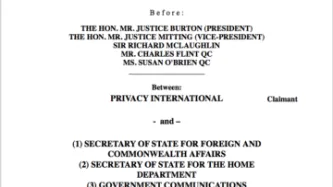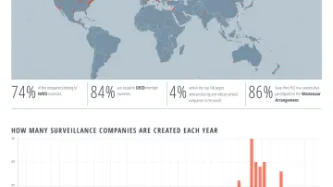Search
Content type: Press release
Privacy International has filed a federal lawsuit seeking to compel disclosure of records relating to a 1946 surveillance agreement between the US, UK, Australia, Canada and New Zealand, known as the “Five Eyes alliance”.* We are represented by Yale Law School’s Media Freedom and Information Access Clinic (MFIA). The most recent publicly available version of the Five Eyes surveillance agreement dates from 1955. Our complaint was filed before the U.S. District Court for the District of Columbia…
Content type: Report
This report sheds light on the current state of affairs in data retention regulation across the EU post the Tele-2/Watson judgment. Privacy International has consulted with digital rights NGOs and industry from across the European Union to survey 21 national jurisdictions (Austria, Belgium, Bulgaria, Croatia, Cyprus, Czech Republic, France, Germany, Hungary, Ireland, Italy, Luxembourg, the Netherlands, Poland, Portugal, Romania, Slovakia, Slovenia, Spain, Sweden, and the United Kingdom).…
Content type: Press release
Key points
Privacy International surveyed 21 EU member states' legislation on data retention and examined their compliance with fundamental human rights standards
0 out of the 21 States examined by PI are currently in compliance with these standards (as interpreted in two landmark judgements by the Court of Justice of the European Union: Tele-2/Watson and Digital Rights Ireland)
Privacy International is calling for:
EU member states to review their legislation on data retention…
Content type: Press release
Privacy International, in partnership with 30+ national human rights organisations, has today written to national intelligence oversight bodies in over 40 countries seeking information on the intelligence sharing activities of their governments.
Countries may use secret intelligence sharing arrangements to circumvent international and domestic rules on direct surveillance. These arrangements can also lead to the exchange of information that can facilitate human rights abuses,…
Content type: Press release
On 5 October 2017, Privacy International will appear before the UK Court of Appeal to continue its challenge to the British government's large scale hacking powers. The case questions the decision by the Investigatory Powers Tribunal (IPT) to sanction the UK government's power to hack broad categories of people or property without any individualised suspicion.
TIMELINE AND KEY POINTS
- Privacy International began fighting bulk government hacking in 2014 at the…
Content type: Press release
While welcoming the objective of the Bill, Privacy International has sent a briefing to the House of Lords and a letter to Minister of State for Digital, Matt Hancock MP, outlining key concerns and recommendations. The Bill's stated aim is “to create a clear and coherent data protection regime”, and to update the UK data protection law, including by bringing the EU General Data Protection Regulation (GDPR) and the Data Protection Law Enforcement Directive (DPLED) - into the UK domestic system.…
Content type: Long Read
This piece was originally published in Just Security in August 2017
We recently published an analysis in Lawfare of the United Kingdom’s surveillance framework as it relates to the proposed U.S.-U.K. agreement for cross-border law enforcement data requests. Implementing the U.S.-U.K. agreement is subject to passage of draft legislation proposed by the Justice Department to Congress in July 2016 (“U.S. DOJ legislation”), which will set standards that approved partners like the U.K.…
Content type: Long Read
This piece was originally published in Lawfare in July 2017.
The United Kingdom has been a key partner in the United States’ efforts to reform the process that law enforcement officials use to make cross-border requests for data. These efforts address both foreign governments’ requests for data stored in the U.S. and reciprocal requests by the U.S. government for data stored abroad. As part of these efforts, the U.S. and the U.K. have negotiated a draft bilateral agreement (“U…
Content type: Press release
Please find attached a copy of the briefing along with promotional photographs with the briefing.
Privacy International has today sent top EU and UK Brexit negotiators* a briefing on their vulnerability to potential surveillance by each other, and others. Brexit negotiations are to begin today.
The global privacy rights NGO has highlighted to the negotiators the risk of sophisticated surveillance capabilities being deployed against each other and by others, and provided…
Content type: Long Read
This piece was originally published in Lawfare in May 2017.
This post is part of a series written by participants of a conference at Georgia Tech in Surveillance, Privacy, and Data Across Borders: Trans-Atlantic Perspectives.
Cross-border law enforcement demands have become increasingly important to law enforcement in the digital age. Digital evidence in one jurisdiction—such as the United States—is often necessary to investigate a crime that has effects in another jurisdiction…
Content type: News & Analysis
Creative Commons Photo Credit: Source
The financial services industry is eager to gather more and more data about our lives. Apart from mining the data they have historically collected such as credit history, they are looking to use our social media profiles to reach into our friendships and social interactions. They are using these data in new and unexpected ways, including personality profiling to determine the risk of lending to you, and thus the price you will pay.
Firstcarquote, a…
Content type: Long Read
Disclaimer: This piece was written in April 2017. Since publishing, further information has come out about Cambridge Analytica and the company's involvement in elections.
Recently, the data mining firm Cambridge Analytica has been the centre of tons of debate around the use of profiling and micro-targeting in political elections. We’ve written this analysis to explain what it all means, and the consequences of becoming predictable to companies and political campaigns.
What does…
Content type: Long Read
Introduction
A growing number of governments around the world are embracing hacking to facilitate their surveillance activities. Yet hacking presents unique and grave threats to our privacy and security. It is far more intrusive than any other surveillance technique, capable of accessing information sufficient to build a detailed profile of a person, as well as altering or deleting that information. At the same time, hacking not only undermines the security of targeted systems, but also has…
Content type: News & Analysis
Brexit and Privacy
It's as clear as mud, what it means when a country decides to willingly pull out of a trading bloc, a policy coordination mechanism, a relatively democratic network, and a framework for the free flow of people, data, and rights. Meanwhile today the minister in charge of surveillance for the past six years will assume the leadership of the country.
There is much speculation as to what is next. Here's our take. Importantly, there's a lot to be worried about, some to like…
Content type: Press release
For further information please contact PI Legal Officer Millie Graham Wood: [email protected]
For media enquiries please contact [email protected]
Documents obtained by Privacy International reveal the existence of a secret oversight function given to the Intelligence Services Commissioner (ISC), in operation since at least 2014. The details of this function, referred to as the ‘third direction’, remain redacted and only came to light following…
Content type: Press release
Privacy International has today written to government ministers, members of the opposition, and oversight bodies reaffirming its call for the UK government to reveal secret intelligence sharing arrangements with the United States.
The original UKUSA agreement — drafted shortly after World War II — allows UK and US agencies to share, by default, any raw intelligence, collection equipment, decryption techniques, and translated documents.
Current arrangements also allow US…
Content type: Long Read
This piece was written by Ashley Gorski, who is an attorney at the American Civil Liberties Union, and PI legal officer Scarlet Kim and originally appeared in The Guardian here.
In recent weeks, the Hollywood film about Edward Snowden and the movement to pardon the NSA whistleblower have renewed worldwide attention on the scope and substance of government surveillance programs. In the United States, however, the debate has often been a narrow one, focused on the…
Content type: Long Read
On 17 October 2016, the Investigatory Powers Tribunal handed down judgment in a case brought by Privacy International against the Foreign Secretary, the Home Secretary and the three Security and Intelligence Agencies (MI5, MI6 and GCHQ).
The case concerned the Agencies’ acquisition and use of bulk personal datasets (‘BPD’) – datasets that contain personal data about individuals, the majority of whom are unlikely to be of intelligence interest, such as passport databases and finance-related…
Content type: Long Read
This week, Privacy International, together with nine other international human rights NGOs, filed submissions with the European Court of Human Rights. Our case challenges the UK government’s bulk interception of internet traffic transiting fiber optic cables landing in the UK and its access to information similarly intercepted in bulk by the US government, which were revealed by the Snowden disclosures. To accompany our filing, we have produced two infographics to illustrate the…
Content type: Press release
Key points
Privacy International, Liberty, Amnesty International, and seven other human rights organizations challenge UK mass surveillance and UK access to US mass surveillance at the European Court of Human Rights
This is the first case before the European Court of Human Rights to directly challenge UK and US mass surveillance revealed by the Snowden disclosures
National courts and oversight bodies have failed to rein in mass surveillance practices that impact hundreds of millions of…
Content type: Press release
Today, Privacy International, together with five internet and communications providers from around the world, have lodged an application before the European Court of Human Rights to challenge the British Government's use of bulk hacking abroad. Until we brought our original case at the Investigatory Powers Tribunal (IPT) in 2014, the Government had never admitted that it engaged in hacking. Now we are learning for the first time how far-reaching the Government's global hacking capabilities are…
Content type: News & Analysis
Privacy International is today proud to release the Surveillance Industry Index (SII), the world's largest publicly available educational resource of data and documents of its kind on the surveillance industry, and an accompanying report charting the growth of the industry and its current reach.
The SII, which is based on data collected by journalists, activists, and researchers across the world is the product of months of collaboration between Transparency Toolkit and Privacy…
Content type: Long Read
Privacy International’s case on Bulk Personal Datasets and Bulk Communications Data comes to a head with a four-day hearing in the Investigatory Powers Tribunal which commenced on 26 July 2016.
The litigation has brought to light significant revelations about the use of section 94 of the 1984 Telecommunications Act to obtain bulk communications data.
Large amounts of disclosure have shed new light on this hitherto secret power and explained confusing aspects of the Government’s Response to…
Content type: News & Analysis
One of the most controversial aspects of the UK's Investigatory Powers Bill proposes the storing by ISPs and mobile network providers of 'Internet Connection Records' (ICRs). While vaguely defined, they will include your internet browsing history (although the Government is at pains to clarify that only the websites you visit, not the specific webpages on those websites will be stored), and what apps you have accessed, over the previous 12 months.
Clearly then ICRs are personal…
Content type: Press release
Today Sir Stanley Burnton, the Interception of Communications Commissioner, published a highly critical review of the use of Section 94 of the Telecommunications Act 1984 for gathering vast amounts of our communications data in bulk. This obscure clause pre-dates the internet era, but has been used for nearly two decades for mass surveillance. Today is the first time that these powers have been criticised by an independent statutory body. IOCCO is critical of the Government's use of these…
Content type: Long Read
This piece originally appeared here.
On both sides of the Atlantic, we are witnessing the dramatic expansion of government hacking powers. In the United States, a proposed amendment to Rule 41 of the Federal Rules of Criminal Procedure would permit the government to obtain a warrant, in certain circumstances, to hack unspecified numbers of electronic devices anywhere in the world. Meanwhile, across the pond, the British Parliament is currently debating the Investigatory…
Content type: Press release
Judges of the Investigatory Powers Tribunal visited MI5 in 2007 for a secret briefing. None of the judges hearing the case this week attended the briefing.
At the briefing, MI5 persuaded the judges that MI5 did not usually have to disclose its data holdings in “Bulk Personal Datasets” to the Tribunal. These are highly intrusive datasets that have details of a vast number of people's location, internet use, financial information and telephone records.
This meant that, as complaints were…
Content type: Press release
Tomorrow, on 26 July, the main hearing will begin in Privacy International's legal challenge against MI6, MI5, and GCHQ's collection of bulk communications data and bulk personal datasets. Previously secret documents will be made public at the hearing, and Privacy International will brief attending journalists about the significance of the disclosed documents.
The hearing will include references to important documents detailing the collection of data on every citizen in the…
Content type: Press release
Harmit Kambo, Campaigns Director, Privacy International said
"The overwhelming vote by MPs last night in favour of massively intrusive new state surveillance powers represents both a failure of the democratic process and a grim watershed moment for the privacy of every one of us.
Over the course of the Bill Committee stage, Privacy International, alongside experts from academia, technology firms, the legal profession, human rights organisations, and civil liberties groups have proposed over…
Content type: Press release
Privacy International releases previously confidential correspondence between lawyers for MI5 and GCHQ and the former Interception of Communications Commissioner, highlighting problems with the relationship between the two bodies
The correspondences show a lack of meaningful oversight and restraint of UK surveillance agencies
Ahead of the vital commons vote on the Investigatory Powers Bill, we need to create a system that guarantees better oversight of surveillance powers…













